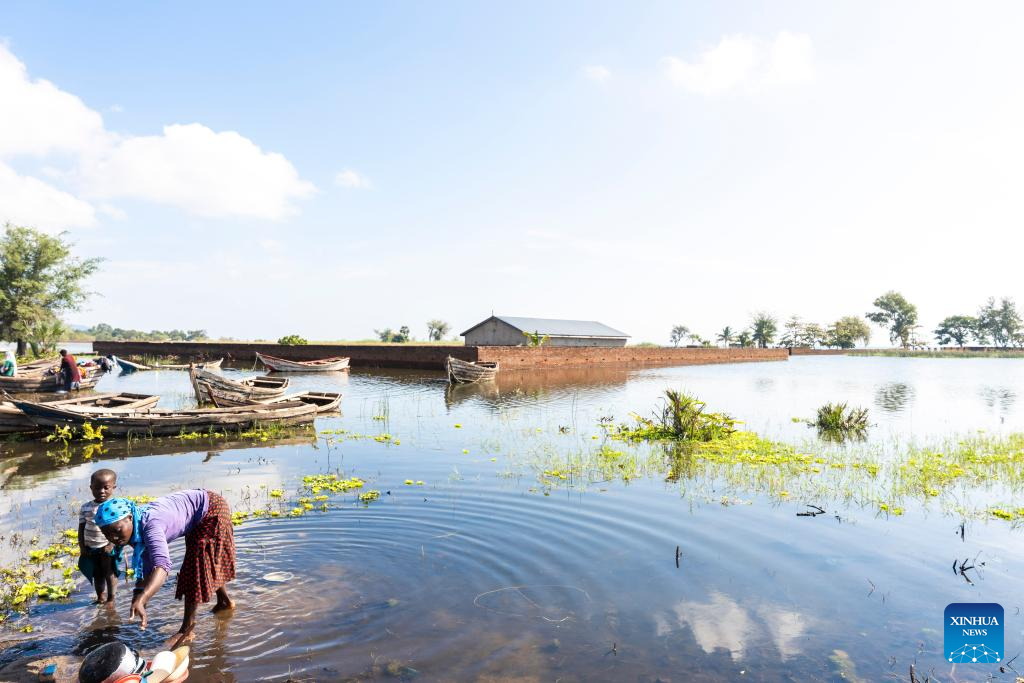
A woman washes kitchen utensils at the lakeshore of Lake Malawi in Mangochi, Malawi, April 21, 2024. (Photo by Joseph Mizere/Xinhua)
MANGOCHI, Malawi, April 23 (Xinhua) -- Yusuf Alid, a local fisherman, stares at his nearly submerged house, feeling the weight of his hard work and investment in what was meant to be his future home.
The house, which cost him close to 14 million Kwacha (about 8,080 U.S. dollars), represents a significant sum for an ordinary individual in the lakeshore community of Lake Malawi, now inundated with water.
"My house was almost ready for occupation, but it is now damaged. I never thought this could happen to me as the shores have been safe for years. I saved money for 10 years to move my family here. People have lived here for generations without this ever happening. It is really sad," said 35-year-old Alid, who has five kids in Mangochi, a lakeshore town in eastern Malawi.
Another victim of the wandering waters, Amina Saidi, a 26-year-old mother of three, complained that the development is a threat not only to her security but to her health and that of her family.
"As a mother, what scares me the most isn't just the water going up, but the hidden dangers it brings," Amina explained, her voice shaky with emotion. "Every little splash, every drop could bring a sickness that might hurt my family and take away our future.
"My house has not been affected by the rising water levels, but with the water encroaching on a wider part of our lakeshore community, there is a high risk of waterborne diseases such as cholera. This is a threat to us," she said.
Earlier this year, flash floods devastated two lakeshore districts of Malawi, namely Nkhotakota in the central region and Karonga in the northern region, leaving thousands displaced and seven persons dead, according to authorities.
In the months of March and April, hundreds of households have had to evacuate their homes along the lakeshore, a development reported in most lakeshore districts such as Nkhata Bay in the north, Nkhotakota and Salima in the center, and Mangochi in the east.
The flooding of Lake Malawi has also disrupted the hospitality industry as lodging places and waterfront structures along the shore have completely closed due to the floods.
According to the spokesperson for the National Water Resources Authority, Masozi Kasambala, the rise in water levels in Malawi has occurred due to heavy downpours of rain this year, sending large amounts of water into the lake.
Additionally, there was significant rainfall in the north of Malawi and in Tanzania, which also feeds water into Lake Malawi, contributing to the rise in lake levels.
"We are concerned that people have been affected by an avoidable water-related catastrophe. The reason is that some developers constructed the buffer zones. As the lake was reclaiming its territory, some people have ended up being affected," said Kasambala.
Meanwhile, authorities in Malawi have enhanced civic education among people in the lakeshore areas to remind them of the importance of adhering to the government's instructions regarding how they should manage lakeshore areas.
"We have enhanced a civic education drive for the populace to stick to acceptable practices to avoid a recurrence of the current unfortunate scenario. We envisage that this interaction will ground them in the right knowledge and allay misinformation and disinformation revolving around the water level increase," Kasambala added. ■

This photo taken on April 21, 2024 shows a waterlogged building on the lakeshore of Lake Malawi in Mangochi, Malawi. (Photo by Joseph Mizere/Xinhua)



